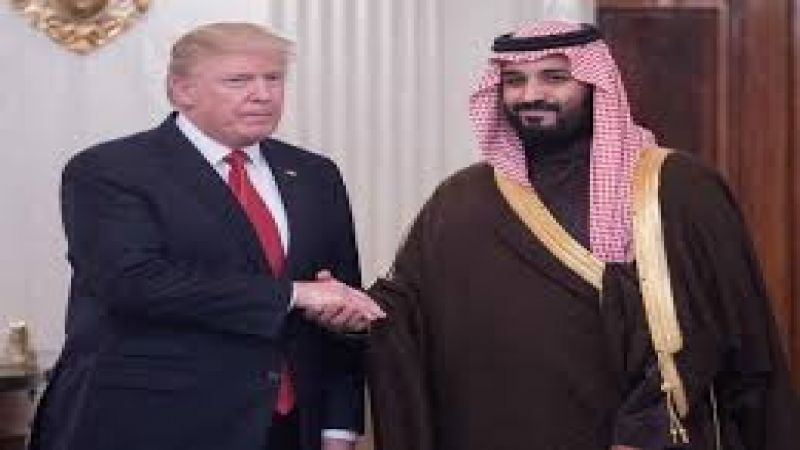
By Mohammad al-Hosseiny
Donald Trump will start his first foreign tour since his election as President of the United States this Friday. Saudi Arabia will be his first stop, followed by the Zionist entity, the Vatican, then Brussels to attend the NATO summit and Sicily to attend the G7 summit. Riyadh will be the harbinger of many Arab presidents, leaders, kings and princes who are eager to attend and pledge allegiance to the "American Shah" and witness the launch of the new "Trump" era in the region.
Saudi Arabia is an ally of America
Just like magic, Saudi Arabia has turned from a state sponsoring terrorism and a major financier of bombings and killings in America and the world to a strong and friendly country that represents the heart of the Muslim world in the eyes of the US administration. Washington is keen on its vital interests with it, and the US effort in the next phase is based on the alliance with Saudi Arabia and the Gulf countries in fighting terrorism in the region represented by Iran and seeking to remove President Bashar al-Assad and ending his regime.
US Secretary of Homeland Security John Kelly introduced this visit saying “The relationship between Saudi Arabia and the United States has been strong for decades. The president sees Saudi Arabia as the key country for stability in this part of the world. The visit to it is first to pay his respects to the Islamic world and then to Saudi Arabia as the heart of that, and as the anchor for the region.” According to Kelly himself, the United States has "huge and vital common economic interests … so these interests should not be compromised."
Trump ensures deals after the presidency
So it is not magic. There is also no change in the rules of the game that Deputy Crown Prince Mohammed bin Salman contributed to crystallizing during his visit to Washington in March. The US President Donald Trump’s new position is not the result of advise from his aids, insisting that he redo his political calculations toward the region. Its simply due to the Saudi dollars that poured on Trump, and will pour down during the years of his rule, and may also continue beyond his rule.
Trump promised the world that Saudi Arabia would pay for every effort made by the United States to protect it and compensate every American soldier killed for the implementation of this protection. Today, he is close to fulfilling this promise with Saudi submission. The man did not need to invoke many positions and threats for Saudi officials rushed to Washington appealing to Trump, offering sacrifices, investment and arming. As a condition for this visit, Trump insisted that a Saudi-Gulf declaration of these offers and their values be announced.
300 billion dollars and more?!
Saudi Arabia has pledged $ 40 billion worth of investments in US infrastructure. Bloomberg sources announced that the kingdom's sovereign wealth fund will unveil the plans coinciding with Trump's visit. Saudi Energy Minister Khalid Al-Falih said “the US infrastructure in particular was an attractive investment.” The White House issued a statement saying the president supports the development of "a US-Saudi program by joint working groups to be invested in energy, industry, infrastructure and technology.” It is expected to be worth $ 200 billion in direct and indirect investment in the next four years.
Before Trump's visit to Saudi Arabia, a series of nearly $ 100 billion worth of arms deals were presented. These were suspended by the administration of former President Barack Obama during the final months of his term due to reports condemning Saudi Arabia's human rights violations and the crimes committed by its forces in its war against Yemen that has resulted in a large number of civilian casualties. White House sources said that "this series has reached its final stages and will be ready before the arrival of Trump to Saudi Arabia," noting that "the arms package could reach more than 300 billion dollars over a decade."
Iran, Syria and Yemen are at the heart of the deal
In the other aspect of Trump's deals with Saudi Arabia, it was necessary to announce a set of US commitments required by the political and financial scene. These commitments do not shy away from Washington's role in selecting who governs in Saudi Arabia, which appears to be leading towards Mohammad Bin Salman, reflected in his positions announced in his recent interview with Al Arabiya. In the forefront of these commitments is a triangle: Iran, Syria and Yemen. This triangle has sharp angles that Saudi Arabia failed to break or rotate.
The American friend had to be used to confront them. The positions of US Secretary of Homeland Security John Kelly were the most severe, as he promised Iran “heavy economic and military sanctions,” adding that the days of Syrian President Bashar al-Assad "are numbered and the countdown has begun." He said, "Not only is the ‘ISIS’ organization the main source of terrorism, there are incubators for this terrorism, especially Iran, which Trump declared as the first terrorist state in the world, and Hezbollah and the Houthis.”
But will Trump risk all the gains he has so far made from Saudi Arabia by igniting fires in the region that no one could put out? Will he overturn the table of regional and international balances for the sake of the rulers of Saudi Arabia? Trump considers the gains as a down payment. As he said, he does not work as a guard for the Gulf. But if Saudi Arabia - the third country in the world in terms of armaments - chooses to play with fire, US arms factories are ready to supply it as long as Saudi dollars flow unceasingly.
Source: Al-Ahed News